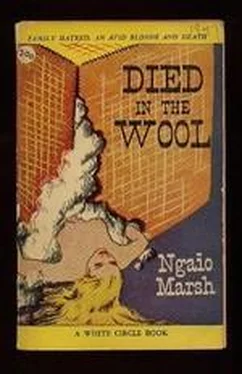Ngaio Marsh - Died in the Wool
Здесь есть возможность читать онлайн «Ngaio Marsh - Died in the Wool» — ознакомительный отрывок электронной книги совершенно бесплатно, а после прочтения отрывка купить полную версию. В некоторых случаях можно слушать аудио, скачать через торрент в формате fb2 и присутствует краткое содержание. Жанр: Классический детектив, на английском языке. Описание произведения, (предисловие) а так же отзывы посетителей доступны на портале библиотеки ЛибКат.
- Название:Died in the Wool
- Автор:
- Жанр:
- Год:неизвестен
- ISBN:нет данных
- Рейтинг книги:4 / 5. Голосов: 1
-
Избранное:Добавить в избранное
- Отзывы:
-
Ваша оценка:
- 80
- 1
- 2
- 3
- 4
- 5
Died in the Wool: краткое содержание, описание и аннотация
Предлагаем к чтению аннотацию, описание, краткое содержание или предисловие (зависит от того, что написал сам автор книги «Died in the Wool»). Если вы не нашли необходимую информацию о книге — напишите в комментариях, мы постараемся отыскать её.
Died in the Wool — читать онлайн ознакомительный отрывок
Ниже представлен текст книги, разбитый по страницам. Система сохранения места последней прочитанной страницы, позволяет с удобством читать онлайн бесплатно книгу «Died in the Wool», без необходимости каждый раз заново искать на чём Вы остановились. Поставьте закладку, и сможете в любой момент перейти на страницу, на которой закончили чтение.
Интервал:
Закладка:
“Actually, you know, the circumstances were a bit suspicious. He opened his bedroom door and saw a light disappear in the direction of your room. That afternoon, as you yourself admit, you’d come upon Captain Grace and Mr. Losse arranging where they’d leave the key of the workroom. I think he had some cause for alarm.”
Markins darted a very sharp glance at Alleyn. “She never said a word about that,” he said.
“She didn’t?”
“Not a word. Only that the Captain was upset because he thought I’d been poking about the passage late at night. I didn’t hear what they were saying that afternoon. They spoke too low and stopped as soon as they saw me.” He gave a thoughtful hiss. “That’s different. It’s a whole lot different. Saw something did he?”
“A light,” said Alleyn and repeated Douglas’ account of the night prowler.
“The only tangible bit of evidence and I miss it,” said Markins. “That’s the way to get promotion. I’m disgusted.”
Alleyn pointed out that, whoever the night prowler might have been, he didn’t gain access to the room that night. But Markins instantly objected that this failure must have been followed by success as copies for designs had been handed over to the Portugese journalist at Easter. “You’re disappointed in my work, sir,” he whispered dolorously. “You’re disgusted and I’m sure I don’t blame you. Put it bluntly, this expert’s been one too many for me. He’s got into that room and he’s got away with the stuff and I don’t know who he is or how he did it. It’s disgraceful. I’d be better in the Middle East.”
“Well,” said Alleyn, “it’s a poor show, certainly, but I shan’t do any good by rubbing it in and you won’t do any good by calling yourself names. I’ll look at the room. Losse has rigged a home-made but effective shutter that’s padlocked over the window every night. There’s a Yale lock on the door and after the scare he wore the key on a bootlace round his neck. You can gain entrance by boring a hole in the door-post and using wire. That might have been the prowler’s errand on the night Grace heard him. He failed then but brought it off some time before Easter. How about that?”
“No, sir. I kept an eye on that lock. There’d been no interference. While they were away at the races that Easter I took a good look round. The room was sealed all right, Mr. Alleyn.”
“Very well, then, the entrance was effected before the scare when they were not so careful and the interloper was returning for another look when Grace heard him. Any objections?”
“No,” said Markins slowly. “No. He’d got enough to work on for the stuff he handed to the Portuguese, and he kept it until the man got to this country. That’ll work.”
“All right,” said Alleyn. “Any suspicions?”
“It might have been the old girl herself,” said Markins, “for anything I know to the contrary. There!”
“Mrs. Rubrick?”
“Well, she was in and out of the room often enough. Always tapping at the door and saying: ‘Can my busy bees spare me a moment?’ ”
Alleyn stirred and his shadow moved on the wall. It might be difficult to interview Markins at great length during the day and he himself had a formidable program to face. Four versions of Flossie already and it must now be half-past two at least. Must he listen to a fifth? He reached out his hand for his cigarettes.
“What did you think of her?” he asked.
“Peculiar,” said Markins.
“Ambitious,” Markins added, after reflection. “The ambitious type. You see them everywhere. Very often they’re childless women. She was successful, too, but I wouldn’t say she was satisfied. Capable. Knew how to get her own way, but once she’d got it liked everybody else to be comfortable when she remembered them. When women get to her age,” said Markins, “they’re one of three kinds. They may be O.K. They may go jealous of younger women and peculiar about men, particularly young men, or they may take it out in work. She took it out in work. She thrashed herself and everybody round her. She wanted to be the big boss, and round here she certainly was. Now, you ask me, sir, would she be an enemy agent? Not for money, she wouldn’t. She’d got plenty of that. For an idea? Now, what idea in the Nazi book of words would appeal to Madam? The Herrenvolk spiel? I’d say, yes, if she was to be one of the Herrenvolk . But was she the type of lady who’d work against her own folk and her own country? Now, was she? She was great on talking Imperialism. You know. The brand that’s not taken for granted quite so much, these days. She talked a lot about patriotism. I don’t know how things are at Home, sir, having been away so long, but it seems to me we are getting round to thinking more about how we can improve our country and bragging about it less than we used to. From what I read and hear, it strikes me that the people who criticize are the ones that work and are most set on winning the war. Take some of the English people who got away to the States when the war began. Believe me, a lot of them talked that big and that optimistically you’d wonder how the others got on in the blitz without them. And when there was hints about muddle or hints that before the war we’d got slack and a bit too keen on easy money and a bit too pleased with ourselves — Lord, how they’d perform. Wouldn’t have it at any price! I’ve heard these people say that what was wanted at Home was concentration camps for the critics and that a bit of Gestapo technique wouldn’t do any harm. Now Mrs. Rubrick was a little in that line of business herself.”
“Miss Harme says she wanted to stay in England and do a job of work.”
“Yes? Is that so? But she’d have had to be the boss or nothing, I’ll be bound. My point is this, Mr. Alleyn. Suppose she was offered something pretty big in the way of a position, a Reich-something-or-other ship, when the enemy had beaten us, would she have fallen for the notion? That’s what I asked myself.”
“And how did you answer yourself?”
“Doubtful. Not impossible. You see with her as the only member of the house who had a chance of getting into this workroom I thought quite a lot about Madam. She might have got a key for herself when she had the Yale lock put on the door for the young gentlemen. It wasn’t impossible. She had to be considered. And the more she talked about getting rid of enemy agents in this country the more I wondered if she might be one herself. She used to say that we oughtn’t to be afraid to use what was good in Nazi methods, their youth-training schemes and fostering of nationalistic ideas, and she used to come down very hard on anything like independent critical thinking. It was all right, of course. Lots of people think that way, all the die-hards, you might say. She read a lot of their pre-war books, too. And she didn’t like Jews. She used to say they were parasites. I’d get to thinking about her this way and then I’d kind of come down with a bump and call myself crazy.”
Alleyn asked him if he had anything more tangible to go on and he shook his head mournfully. Nothing. Beyond her curiosity about the young men’s work, and she was by nature curious, there had been nothing. There was, he said, another view to take, and in many ways a more reasonable one. Mrs. Rubrick had been appointed to a counter-espionage committee and, in that capacity, may have threatened the success of an agent. She may even have formed suspicions of a member of her household and have given herself away. She was not a discreet woman. This, pushed a little further, might produce a motive for her murder.
“Yes,” said Alleyn dryly. “That’s why Captain Grace thinks you killed her, you know.”
Markins said with venom that Captain Grace was not immune from suspicion himself. “He’s silly enough to do anything,” he whispered angrily. “And what about his background, anyway? Heidelberg. He doesn’t look so hot. And what about him being a Nazi sympathizer? I may be dumb but I haven’t overlooked that little point.”
Читать дальшеИнтервал:
Закладка:
Похожие книги на «Died in the Wool»
Представляем Вашему вниманию похожие книги на «Died in the Wool» списком для выбора. Мы отобрали схожую по названию и смыслу литературу в надежде предоставить читателям больше вариантов отыскать новые, интересные, ещё непрочитанные произведения.
Обсуждение, отзывы о книге «Died in the Wool» и просто собственные мнения читателей. Оставьте ваши комментарии, напишите, что Вы думаете о произведении, его смысле или главных героях. Укажите что конкретно понравилось, а что нет, и почему Вы так считаете.










